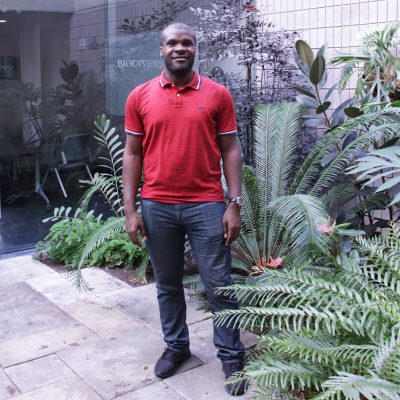Student Spotlight: Alex Ogbonna

September 27, 2021
Alex Ogbonna is a doctoral candidate in plant breeding from Imo State, Nigeria. After attending Imo State University as an undergraduate, he chose to pursue further study at Cornell for numerous reasons, including the faculty and research. Ogbonna is a 2021 NAPB Borlaug Scholar.
What is your area of research and why is it important?
I am interested in leveraging genomics to expand insights on domestication and diversification with the aim of improving crop adaptation in cassava, a tropical starchy root crop. My research focus is to understand the impact of modern breeding practices on how the landscape of genetic contribution to some phenotypes has evolved through the process of adapting cassava for human use. Cassava has faced a couple of challenges in Sub-Saharan Africa (SSA), including dry matter and provitamin A carotenoid content that cannot be improved at the same time in a specific variety in Africa, but can be done in Latin America. Cassava is primarily cultivated for its dry matter content, while carotenoid content addresses micronutrient deficiency associated with consumption of cassava in developing countries as a sole staple.
What are the larger implications of this research?
The number of people affected by food insecurity keeps increasing throughout the world, including those that suffer from undernutrition from deficiency of micronutrients in their diet, especially in SSA and Asia. Cassava is an important economic and subsistence crop in the tropics, including SSA and Asia, where cases of undernourishment are most prevalent. My research is an effort toward improving the diversity of cassava, a crop widely grown by mostly low-income smallholder farmers as a staple food crop, a group fundamental to addressing global food insecurity.
What does it mean to you to have been selected as a 2021 Borlaug Scholar?
I’m so honored and grateful to be one of the recipients of the NAPB Borlaug Scholar award. I feel proud and delighted to be recognized by colleagues in the field of breeding and to be associated with Dr. Norman Borlaug, a great achiever in the field. It means more visibility and connections with other scientists.
How important has the mentorship component of the program been to your professional development?
I’m looking forward to leveraging the opportunity to learn from my mentor, Hannah Senior, the CEO of PBS international, make more connections, and expand my network within the field of breeding. Though I have had one meeting with my mentor, and am looking forward to future meetings, I believe it will have a positive impact on my professional development beyond the duration of the mentorship program.
What are your hobbies or interests outside of your research or scholarship?
I enjoy playing soccer, reading books on leadership, traveling, and learning about different cultures.
Why did you choose Cornell to pursue your degree?
Given that I’ve worked on campus with the Mueller Lab for a couple years, I was naturally drawn to Cornell CALS program. The massive international collaborations, outstanding faculty, cutting edge research, access to resources, and the nature of the Ithaca community made it a lot easier to choose Cornell.
